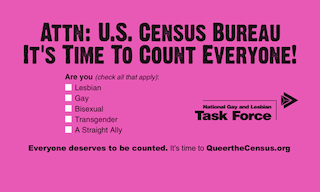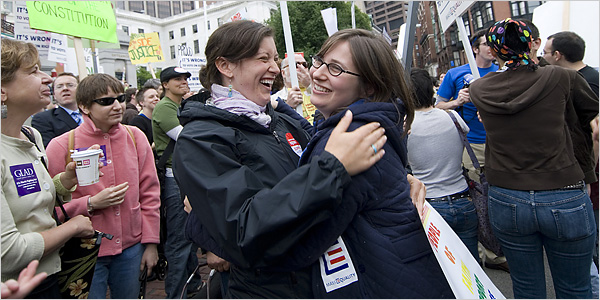
This November the U.S Census Bureau will have a much easier time counting the gays then they’ve had for the last ten years because the 2010 census is the first which will count same-sex couples as same-sex couples and now that gay marriage is legal in five states it will be infinitely easier to count those people. Back in 2000, however, a lot of couples were already reporting themselves as spouses despite not being married according to the government’s definition.
However data from the Census’ 2005-2009 American Community Survey has been analyzed and has discovered the following — the top ten cities by proportion of same-sex couples, as “identified by the percentage of households occupied by unmarried partners of the same sex”:
1. San Francisco-Oakland-Fremont, Calif. 1.36%
2. Burlington-South Burlington, Vt. 1.12%
3. Barnstable Town, Mass. 1.10%
4. Portland-South Portland-Biddeford, Maine 1.09%
5. Santa Rosa-Petaluma, Calif. 1.03%
6. Portland-Vancouver-Beaverton, Ore.-Wash. 1.00%
7. Santa Cruz-Watsonville, Calif. 0.95%
8. Springfield, Mass. 0.92%
9. Seattle-Tacoma-Bellevue, Wash. 0.91%
10. Boston-Cambridge-Quincy, Mass.-N.H. 0.91%
What is interesting about this list is that all of the cities are in states that currently allow same-sex marriage or domestic partnerships. However, only Massachusetts and Maine allowed either for all of the given time period, while the rest started after the data gathering began. According to USNews:
“The data suggests that a large proportion of same-sex couples in a city, state, or region is a factor that sets the stage for legislation granting marriage rights to non-heterosexual couples.”
Obviously this makes sense, since the more gay people there are in an area, the greater chance there is of them being able to get things like “rights” and “equality.” But the interesting part is that the public sentiment in support of the gay community likely existed before any policy-based action happened.

in massachusetts gay couples are happy
According to a representative from the Human Rights Campaign,
“It is more likely, if you have an organized and active LGBT [lesbian, gay, bisexual, and transgender] community, that you’re going to see relationship recognition happen. This climate would have to come together before the political process.”
In other words, people didn’t move to those cities because same-sex partnerships were OK. Same-sex partnerships moved to those cities because gay people were OK. The HRC also says:
“One of the largest factors is really about perception, and how a place is perceived to be welcoming or not.”
It’s also important to note that while the list is new, the data it’s based on is dated, and incomplete — while many gay couples listed themselves as spouses in the 2000 Census, same-sex partnership wasn’t recognized anywhere yet, making the results partial at best.
While the inclusivity of the 2010 Census is an improvement, there are still endless problems — for instance, information on sexual orientation of individuals is not recorded — which is what makes getting an estimate of the gay population so difficult and results so riddled with problems. This is what was behind the National Gay & Lesbian Task Force’s pink stickers last year which hopefully you all filled out.
Finally, because I am Canadian and haven’t had to fill out a census yet and Did Not Know This, there were only five questions on the 2010 Census anyway (age, sex, race/ethnicity, relationship, and living situation/rent/own a home), and changing them takes years of development and advocacy.
According to Queer the Census, change, when it does happen, will be important:
And until that information is gathered in a way that’s full and complete and includes individuals as well as married partners and domestic partners and people just living together to see how it feels and everyone, we’re stuck with dated top 10 lists.
There are lots of elements of the fight for marriage equality that we feel we can control — changing the hearts and minds of the citizens through information campaigns, calling voters, going door to door, talking to our friends/family, exposing lies on the other side, taking legislative action and writing articles on The Huffington Post. But if the number of gay people residing in your state is one of the most influential aspects in how that vote turns out — well, we have much less control over that. (Clearly a gay population can’t necessarily make/break a vote, but people who know gay people are more likely to be pro-equal rights, etc., so the more gay people there are to know, the better.) And here we come back tot he problems of having a majority vote on the rights of the minority, especially when the minority is really really small.
It seems like an obvious statistic now that it’s out there — what do you think? Which comes first, the chicken or the egg? How is the gay community mobilized where you live?



Correction: Maine doesn’t allow same sex marriage. A citizens’ veto passed in 2009 before the legislation ever went into effect. :(
yes we remember that sad sad day — but Maine offers domestic partnerships, right? i think that’s what she’s saying in the article, but maybe i missed something.
Maine does allow domestic partnerships. And while from a equal rights perspective allowing domestic partnerships isn’t quite as awesome as allowing gay marriage, the point is that those places still had some legal acknowledgment and also higher concentrations of gay people, which is a clause that as I’m trying it sounds like the vitamin c ad on my orange juice.
As I understand it, Seattle has been pretty gay for awhile now. It was pretty gay when 1998 the state passed its own Defense of Marriage Act, and still quite gay when the state supreme court upheld it as constitutional in 2006. Our “everything but marriage” bill barely when put to a statewide vote in 2009. Gays came first, and changed the political climate over time with their voices and the voices of their allies.
*when in 1998
**barely passed
I am hoping to move to Seattle soon and I’m so excited to be really gay all over the place
I think gay people where I live have just kind of gotten complacent. They figure we aren’t being beaten in the streets, we live in general peace, and the bigots have been bigots for decades and aren’t about to change their minds, so why bother? Personally, I’m saddened by that because it prevents them from stepping up to the plate to defend their own rights- how can they not care?
OH! I’m from Springfield, MA! Sweet…
the only two places i’ve ever lived in the us are on that list… hah.
canada is having a census this year
I did not know that, is it weird I feel excited?
no, i’m super excited too! this is (some of) what i learned in my canadian history class: USA always has census(es?) on years that end with 0, and canada has their census on years that end with 1.
count me as excited by this as well! is it gonna be the long form or the short form? you know harper tried to get rid of the long form entirely, eh? tsk tsk stevie
He doesn’t want to know that we’re out there.
Completely unrealistic, but wouldn’t it be great if the US had a large, well-organised, floating LGBTQ population? They would move to whatever State didn’t have decent civil rights and stay to campaign there till the battle was won, then move on to the next State.
They could also turn up en masse for a few months wherever there was a problem with serious homophobia, which might make serious homophobes think twice before acting out all over us! After all, if you want to keep away from the gays and being openly and violently anti-gay is going to get you a host of gay neighbours for a while, you might think twice about it…
TWO Norcal regions on that list… haaaaayyy.
No ferreal, SF/Oakland/Santa Cruz are hella gay.
Three actually….believe me, Santa Rosa is hella gay too.
Live in Santa Cruz, moving to Burlington this summer…gayness surrounds me everywhere I go, it seems. I love living in a place where I get to see old lesbian couples holding hands and window shopping. <33
Santa Cruz <3 lived there two years ago, it's my favorite.
yay Vermont!
“there were only five questions on the 2010 Census anyway”
!! Are you for real?! How does that possibly give the government any useful information? NZ’s census this year, though it got cancelled, would have had including what languages you speak, whether you smoke, how many children you’ve given birth to, who you live with, if you have any disabilities or illnesses, how much housework you do … and still no question about sexuality and only M/F options for gender. (Although it does separate out same sex and opposite sex civil unions and de facto relationships, and did last time, too.) And then there’s the dwelling form, which is about your house and who lives with you.
Mind you, we’re obviously a lot smaller, and I expect states conduct their own censuses, more regularly and with more detail than the federal one. But still. Five questions? What’s the point, you’re going to have to print and mail it out anyway, right?
No idea how the queer community mobilises here, although I live in the capital and we’re pretty low key generally, so I think it’s probably “get a job working for the government like everyone else, make tiny changes”.
Does anyone know how Santa Fe, NM is about the gayness? I’m moving there soon and I was curious.
I live in St. Petersburg, FL which is a pretty gay city…but it’s still in FL and FL hates the gays, a lot.
Crazy! I’m from St. Pete! Moved away to SoCal about 6 years ago. Florida isnt the best place for any type of culture or environment at all!
Wait – PDX, ME beat PDX, OR??